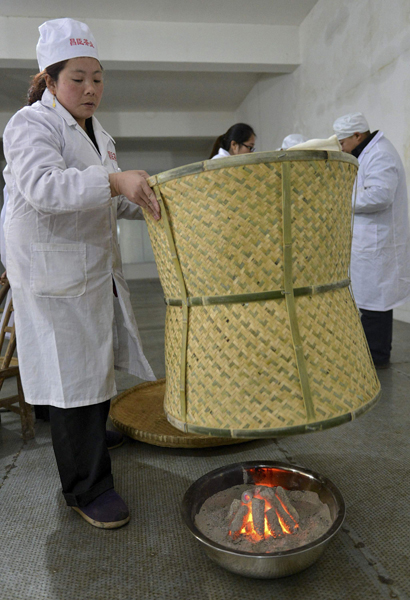Tea time loses its popularity
Updated: 2013-04-04 07:43
By Wu Yiyao (China Daily)
|
||||||||
Longjing tea leaves are roasted soon after picking to stop the action of the natural enzymes. This is a vital process that brings out the fragrance and flavor of the tea. It requires skill and experience to bring out the best in the tea, as the art of tea roasting is the manipulation of time and temperature. The tea leaves are baked in large metal woks, which can be up to a meter in diameter, and the roasters have to be sensitive to the heat and press the fresh tea leaves against the bottom of the wok to make the water evaporate. Too much heat may damage the delicate leaves.
"A working day for a tea roasting technician may last 20 hours, from six in the morning to two in the morning next day," said Mei Chongliang. This is because the roasting can't be paused, or the fragrance of the tea is los.
Unlike previous years when the roasted tea was packed in fine china jars resting in silver-lined wooden cases, the tea this year comes in glass jars or moisture-proof cans. If buyers want extra, the sellers will give them a paper bag.
The hostels and hotels around Meijiawu village also have stores selling mingqian tea in 25-gram tins or 50-gram cans.
However, for Tao Enqian, a tea buyer from Shanghai, the drop in prices is good news as it means the good teas will be more affordable and not just reserved for officials and the wealthy.
"This year no one is snatching the good things from my hands," said Tao, who bought 3 kilograms of the Meijiawu Longjing tea this year to give to his family.
Tea enterprises are also preparing to lower the proportion of high-end tea and enhance sales of excellent middle-market tea, said Luo Liewan, who is in charge of the tea sector with the Zhejiang provincial department of agriculture.
"It is good for consumers and market players to see more affordable tea products. After all, tea is a day-to-day consumed beverage," said Luo.
Contact the writer at wuyiyao@chinadaily.com.cn.

 Li Na on Time cover, makes influential 100 list
Li Na on Time cover, makes influential 100 list
 FBI releases photos of 2 Boston bombings suspects
FBI releases photos of 2 Boston bombings suspects
 World's wackiest hairstyles
World's wackiest hairstyles
 Sandstorms strike Northwest China
Sandstorms strike Northwest China
 Never-seen photos of Madonna on display
Never-seen photos of Madonna on display
 H7N9 outbreak linked to waterfowl migration
H7N9 outbreak linked to waterfowl migration
 Dozens feared dead in Texas plant blast
Dozens feared dead in Texas plant blast
 Venezuelan court rules out manual votes counting
Venezuelan court rules out manual votes counting
Most Viewed
Editor's Picks

|

|

|

|

|

|
Today's Top News
Boston bombing suspect reported cornered on boat
7.0-magnitude quake hits Sichuan
Cross-talk artist helps to spread the word
'Green' awareness levels drop in Beijing
Palace Museum spruces up
First couple on Time's list of most influential
H7N9 flu transmission studied
Trading channels 'need to broaden'
US Weekly

|

|








